Q: What is a grex?
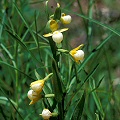 Cypripedium californicum
Cypripedium californicum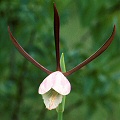 Cleistes divaricata
Cleistes divaricata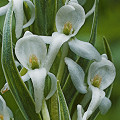 Platanthera dilatata
Platanthera dilatata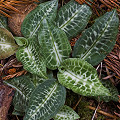 Goodyera oblongifolia
Goodyera oblongifolia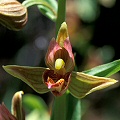 Epipactis gigantea
Epipactis gigantea
A: A grex designates all the plants that
result from a particular artificial crossing of two parent plants. The plural of grex is
greges, although many people write it as grexes.
Grex usage is currently only allowed for orchids; carnivorous plant horticulturists must satisfy themselves
by using either cultivar names, cultivar group names, or informal descriptors that are
different enough from cultivar names as to not be mistaken for them.
I understand the rules for making cultivar names and cultivar group names quite well, and frankly I think
it works pretty nicely. I could whip off a perfectly acceptable cultivar name with a good photograph in about
15 minutes, if it were for a plant I knew. It would take a while for it to be published by a
suitable journal, of course, but it isn't very hard to do. I have established about 20 cultivar names,
and have helped behind the scenes with dozens more.
However, I think it must be acknowledged that many in the carnivorous plant growing community clearly do not
feel like they are being served by the cultivar system. Certainly the subculture that is most vocal in this regard is
the community of Nepenthes growers, and then to a much smaller level the
Sarracenia growers. Some have very compelling arguments, as they note that they might have
thousands of plants in their sales lists, and each has different attributes. Publishing the greges in some kind
of database would be great so buyers could look them up and determine the pedigree of their plants.
My own opinion is that it would be best if we could have both cultivar and grex names. It would be a challenge to manage, of course,
but I think it would be useful. If there is a desire to make a system of tracking plant crosses known, why not invoke one?
It would take a lot of work, and even more so it would take a huge amount of work educating people on how it would be
done, but I think the result would be good.
Page citations: Brickell, C.D. et al. 2004;
Trehane, P. et al. 1995; personal observation.